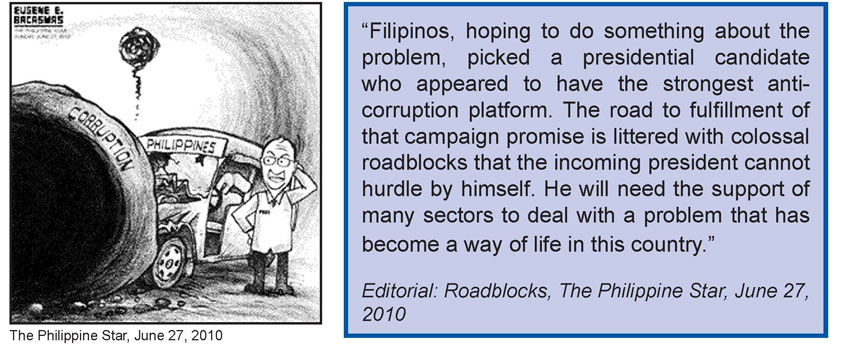Governance
Governance in its broadest sense relates to the quality of national and local government, including the executive, legislative, and judicial branches. Good governance in East Asia is often cited as a critical factor in economic development. In the Philippines, everyone from the president to the poorest citizen knows that the quality of governance has great room for improvement.
Students of the Philippines have often observed that the country is an example of a weak state but is not a failed state. The leading global ranking by the Fund for Peace in its 2010 Failed State Index places the Philippines towards the low end of its “warning” category (see Part 2 Becoming More Competitive).216
Filipinos and foreigners agree that many of the problems of the Philippines could be solved with better governance. The country has long had a reputation for widespread corruption at all levels of government. Two former presidents of the country are included in the Transparency International list of the world’s ten most corrupt leaders, in which the Philippines is the only country included twice.217
• Corruption and political instability
Former president Ferdinand Marcos was forced into exile after 21 years in power, when he was overthrown by the civilian/military EDSA Revolution in 1986, also known as People Power, and died abroad in exile. Former president Joseph Estrada was likewise forced out of office in 2001, after only 30 months, by popular protests supported by the national military leadership. He was arrested and convicted of economic plunder but was later pardoned and placed second when he ran for president in the 2010 elections.218
The vice president who succeeded Estrada, Gloria Macapagal Arroyo, served as president for nine and a half years from January 2001 until June 2010. Although the economy grew every quarter, her administration was marred by allegations of corruption, including alleged vote-buying that led to the
resignation of ten cabinet secretaries in 2005, and record low public opinion approval ratings (see Figure 168.) For much of her presidency, she fought to defend her political legitimacy, having come into office in 2001 through “people power” and having won the 2004 presidential election by a very thin plurality.
“No pardon for anyone convicted of corruption”
—Richard Gordon, Philippine Daily Inquirer, January 23, 2010
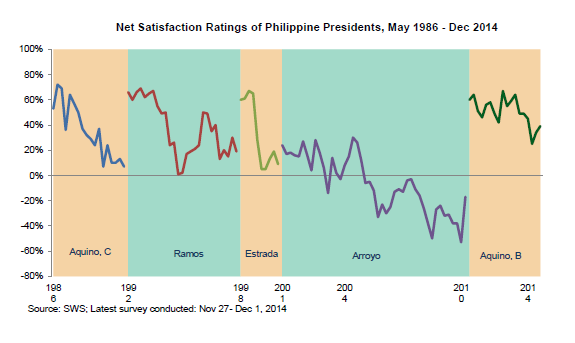
View original figure here
These periods of political instability – particularly 1983 to 1986 and 2000 to 2001 – discouraged domestic and foreign investment and weakened economic growth, while more politically stable regional economies moved forward much faster. Although there are no comparable socio-political upheavals in recent years in terms of magnitude, business perception on the Philippines’ political stability remains gloomy. This only means that in order for the country to get back under the investors’ radar, the government needs to undertake more economically beneficial reforms and maintain longer period of more tranquil business environment (see Figure 169).
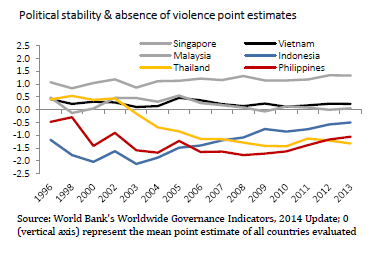
View original figure here
• Political will essential
Voluminous analysis and commentary have been written about corruption in the Philippines with numerous recommended solutions. However what has often been absent in past decades has been political will to control and reduce corruption. Unlike foreign funds and advisors, political capital cannot be imported but can only come from Filipinos with the leadership of a president strongly committed to improving governance.
The new president, Benigno S. Aquino III, was elected with a plurality of 42% percent from a field of nine candidates, and received a very high popular trust rating of 88% in a poll conducted immediately before his June 30 inauguration.219 Expectations are extremely high that he and his cabinet will demonstrate the political will to achieve better governance. Campaigning on an anti-corruption theme, the president created high expectations for improved governance and began office with highly positive political capital.
“Kung Walang Corrupt, Walang Mahirap.” (“If no one is corrupt, no one will be poor”)
—Campaign slogan of President Benigno Aquino III in the 2010 Presidential Elections; President Aquino’s Inaugural Speech, June 30, 2010
Corruption basically robs government of the ability to positively affect the lives of every Filipino
An honest president becomes the role model. He has the moral suasion to tell everybody to toe the line and in fact can go after everybody ho does not toe the line. But we also have to be practical. We give them salaries and packages that would practically guarantee that they will not corrupt
“We don’t want a 20-percent success rate in our anticorruption cases. Once charges are filed, it must be ensured that someone will be found guilty and punished. It shouldn’t be enough that the police arrest suspects. There should be a strong conviction rate because success breeds success.”
—President Benigno Aquino III, Philippine Daily Inquirer, May 9, 2010
• Businessman rank corruption as biggest problem
Because corruption adds to business costs, most opinion surveys of businessmen and investors rank corruption as the most serious problem negatively affecting the Philippine investment climate (see Part 2 Becoming More Competitive). It logically follows that reducing corruption will improve the investment climate. Table 67 shows the rank of the Philippines among other Asian countries in the annual Corruption Perceptions Index published by Transparency International at intervals of four years in 2001, 2005, and 2009. During the decade, the Philippines dropped to the bottom of this list of 14 Asian and South Asian countries, falling behind India, Indonesia, and Vietnam, receiving the same score in 2010 as Bangladesh, Zimbabwe, and Nigeria and just a tenth of a point above Pakistan. The Philippines was rated above all five Asian countries in 2001.220
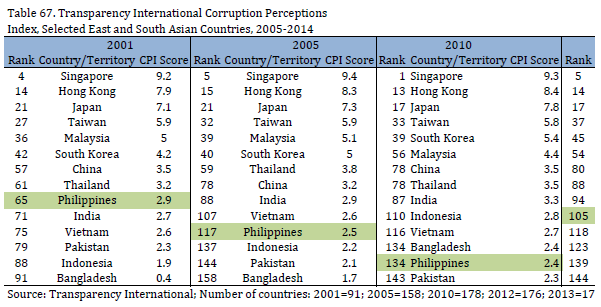
View original table here
“No pardon for anyone convicted corruption”
—Richard Gordon,Philippine Daily Inquirer, January 23, 2010
“We must contain corruption because this evil is not only burden of our citizens, but the scourge of good business and economic productivity. Corruption thrives because there is no transparency and openness in governance.”
—Erap Estrada, The Philippine Daily Inquirer, May 9, 2010
The WEF’s global competitiveness and the World Bank’s governance indicators echo a similar trend (see Figures 171 and 172). Data suggest that: (1) corruption remains on top of business sector concerns, (2) authorities are perceived to be ineffective in curbing the problem relative to regional counterparts, and (3) the problem has become more severe.
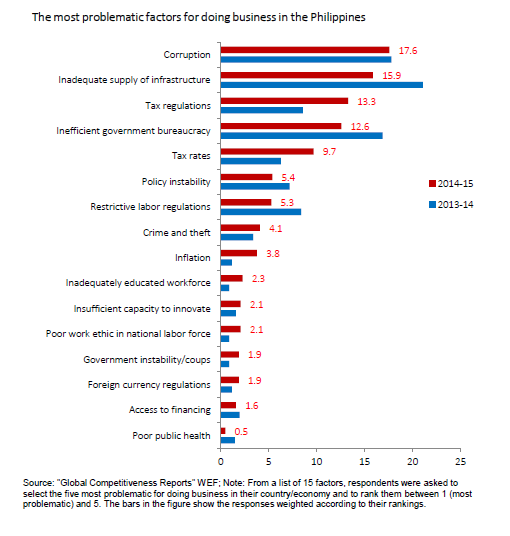
View original figure here
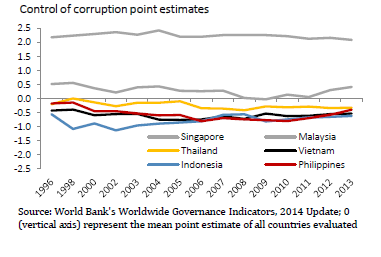
View original figure here
At the national level, corruption results in lost revenues, when taxes and fees are not properly collected or not collected at all, and waste in public sector expenditures when the government spends on unneeded projects and programs and overpriced goods and services. It has been estimated that around a third of government procurement spending is wasted. An example often cited is that the private sector can build the same classroom for much less than what the government spends!
Congress has also been criticized for misuse of its Countryside Development Funds (CDF). Each congressman receives PhP 70 million and each senator PhP 200 million, for a total CDF budget of about PhP 250 billion each year.
“We must take our position clear… this is a fight not only against the public-sector corruption but also a commitment to clean our own ranks in the private sector. Thus, we cannot count on the Aquino administration to take on this fight alone. We must do our part.”
—Ramon del Rosario Jr., MBC Chairman, MBC-ECCP Join Membership Meeting, June 25, 2010
“A sister of mine gave up on her restaurant business because she was being constantly harassed by fire inspectors who wanter her to buy fire extinguishers from them, inspectors from the labor department as well as from DTI who gave broad hints on how they can be appeased… I imagine the hurdles for investors in more controversial enterprises, like mining, would be more daunting.”
—Boo Chanco, Demand and Supply, Philippine Star, June 28, 2010
Widespread and deepening concerns on the quality of governance in the Philippines have clearly hampered the country’s ability to maximize its economic potential. In addition to deadweight losses and financial wastes, a simple mapping of relevant data reveals that over time, the declining strength of governance measures has been accompanied by deteriorating investment ratio – a finding that has been validated and re-validated by extensive literature (see Figure 173).
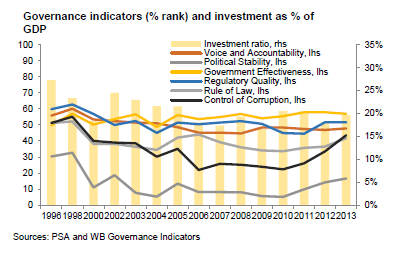
View original figure here
• Some suggested solutions
In addition to adequate political will, suggested solutions include to pay civil servants comparably to the private sector, to reduce, depoliticize and professionalize the bureaucracy and punish severely public officials proven to be corrupt. Strengthening of the Ombudsman and “lifestyle checks” of officials with fiduciary and procurement responsibilities are a good beginning but clearly have been short of the effort needed to end corruption.
“You have to incentivize good behavior and at the same time punish bad behavior. We lack incentives for good behavior in public service.”
—Gilbert Teodoro, The Philippine Daily Inquirer, May 9, 2010
Government processes should be simplified, streamlined, and privatized to reduce the cost of bureaucracy as well as opportunities for corruption by underpaid civil servants. The total number of government employees can be reduced through voluntary retirement incentives, performance reviews, and layoffs. Past plans to do so have often failed because of resistance from government employees.
Government agencies should only be headed by qualified, adequately-paid technocrats. Patronage politics makes government less efficient and prone to policy reversals when administrations change. There are more political appointees in the Philippine government than in the US federal government. Political appointments are often made three or four levels below department secretary. Only competent persons should be named to important posts. Experienced bureaucrats with continuity should be used more and paid fairly.
Government owned and controlled corporations (GOCCs) have long been criticized for creating red ink and being poorly managed. Many of their directors and senior officers were appointed as political favors, and abuses have often been reported in the press and investigated by Congress. The National Food Authority (NFA) is at the top of the list for losing money, PhP 37 billion in 2008 and PhP 63 billion in 2009, and undermining the market price for local rice farmers by subsidizing imported rice. A reform under President Ramos requiring all departments to justify or close down GOCCs was not successful. Many of the reported 143 GOCCs need to be fiscalized, rationalized, privatized, or closed. Abuses by GOCC managers in procurement, salaries, bonuses, and other perquisites have received considerable negative media attention. Such overspending took place while the GOCCs reportedly still owe the national government some PhP 24 billion.
• The smuggling curse
Smuggling is a major concern to domestic and foreign business because it weakens the domestic market for investors in manufacturing and importers who pay the proper duties and taxes. Counterfeit copies of over one hundred well-known brand names are marketed in the Philippines, most imported with the cooperation of customs officials. Following loud complaints from the legitimate business sector, presidents have periodically established special task forces against smuggling, e.g. in 2004 the National Anti-Smuggling Task Force (NASTF), under former Defense Secretary Reyes, and in 2006 the Presidential Anti-Smuggling Group (PASG). The only lasting solution, reform of the Bureau of Customs, has proven extremely difficult to achieve.
Domestic automotive production has been undercut by smuggling (see Part 3 Manufacturing and Logistics). Considerably more vehicles are registered in the Philippines each year than are manufactured and legally imported. The difference is comprised of a large proportion of illegal imports, mostly of used vehicles, many having arrived at special economic zones and some converted without adequate safety inspections. For several years, some used vehicle importers, conspiring with local courts, resisted and undermined national government policy in EO 156 to increase annual domestic automotive production and to eliminate used car imports. Along with negligible job creation, the used vehicle sector also negatively impacts on the government’s import duty and excise tax revenue, since minimum taxes are collected.
Imported oil smuggling increased after the 12% EVAT was applied to petroleum imports and sales. Huge illicit sums that otherwise could build schools and provide better health care are being stolen through under-declaration of oil import volumes. An industry association has estimated annual public revenue losses at PhP 25-30 billion a year in diesel and Avturbo fuel alone. Incredibly, official statistics on oil imports declined in several recent years when GDP grew substantially.
A program was initiated in 2008 to mark petroleum products, either imported or locally refined, that had paid correct taxes with a fluid that could not be detected. Random testing was then made at various gas stations, which, if found to be selling the unmarked product were to be investigated for selling improperly taxed goods.
However, all reports of unmarked products, after being sent to the BOC were referred to the Legal Division, where no action had been taken as of August 2010. Even worse, the BOC’s entire Run after the Smugglers (RATS) program, which developed cases against more than 100 suspected smugglers over five years, did not win a single case, suggesting a severe lack of political will to check smuggling.
China has been a source of many smuggled manufactured goods and food products. China’s statistics for exports to the Philippines are a multiple of comparable Philippine data for imports from China. The Philippine Chinese community, which has contributed many respectable hard working taipans to Philippine commerce and industry, could do more to police its own ranks.
• Strengthen IPR
The Philippines does not adequately protect intellectual property rights (IPR). While the country’s IPR law is fundamentally sound – and strengthened in 2003 with the Optical Media Act – the sale of counterfeit goods remains widespread because of inadequate enforcement and high demand.
IPR cases move slowly through the courts and are subject to judicial irregularities. It can take 5 to 10 years for a simple indictment against a person caught dealing in counterfeit items to be tried. An appeal can add another 2 to 5 years. Consequently, there have been no convictions in the Philippine courts for IPR offenses! This problem can be corrected if the Supreme Court would enforce its rules for courts to expedite such cases.
Enforcement will be most effective when focused on cutting off the supply of counterfeit goods by destroying illegal copying machines, confiscating smuggled contraband from wholesalers, and successfully and quickly prosecuting criminal offenders.
Continued or further deterioration of IPR protection could jeopardize the duty-free Generalized System of Preferences (GSP) entry into the US market of almost US$ 1 billion in annual exports, should the provisions of Section 301 be applied. For many years, the Philippines has been on the US Government Section 301 “watch list” of countries with inadequate IPR enforcement.
“Every transaction must pass the test of transparency. Every act shall be subject to the glare of public scrutiny. Every contract must pass through established rules of public bidding.”
“We must able to defend in the halls of Congress or in the bar of public opinion everything and anything we do in the privacy of our rooms and cubicles”
“Every Filipino must have to access to our services without the aid of fixers. Every license must be processed and issued with the same case and speed of service we render to everyone.”
“Every Franchise shall be given only to qualified applicants and meritorious proponent. In all processes, everyone will play by the same rules.”
—DOTC Secretary Jose de Jesus, addressing DOTC employees, Philippine Daily Inquirer, July 6, 2010
Headline Recommendations
- Demonstrate firm, consistent political will to enforce laws against corruption forcefully in the public and private sectors, in revenue collection, and public expenditures. Government should join the Integrity Initiative and submit government departments to the same control mechanisms as the private sector. An impartial Ombudsman should be strengthened with trained staff. Private sector must do more to police its ranks and initiate compliance and integrity programs.
- Smuggling must be vigorously countered. The BOC with DOJ support should successfully prosecute smugglers. Further reform public sector procurement. Expand e-procurement, reform project selection process and biddingprocedures, and intensify other efforts to reduce waste in public expenditures. Increase public sector transparency.
- Reduce the fiscal burden of GOCCs by fiscalizing, rationalizing, privatizing, and closing. Focus Congressional CDF more on priority social infrastructure needs. Undertake civil service reforms to professionalize government. Reduce red tape. Strengthen Corporate Governance; reduce abuse of intellectual property rights; Legalize jueteng.
Recommendations: (16)
A. The government must demonstrate through consistent example that it has the political will to greatly reduce corruption. Example includes regular application of lifestyle check programs and investigations of government officials in agencies that collect revenues and approve large expenditures and their suspension and prosecution, when warranted. Example includes investigating, bringing charges against, and successfully prosecuting private sector persons and corporations guilty of not paying proper taxes, bribery, and other major corrupt acts. The government should join the Integrity Initiative of the private sector and submit government departments and agencies to the same tools, control mechanisms, and integrity circles as the private sector. (Immediate action DOF, BIR, BOC, DOJ, Ombudsman, judiciary, and private sector)
B. Public officials, in all branches and all levels of government, and private persons found guilty of major corrupt activities should, after a fair trial, be punished with heavy sentences, including imprisonment and seizure of assets. The cases against them should be widely publicized. Laws should be amended periodically to assure that penalties are sufficiently heavy to serve as a deterrent to corruption when enforced. (Medium-term action DOJ, Ombudsman, judiciary, and Congress.)
C. The Ombudsman must be impartial and willing to investigate thoroughly all major allegations of official corruption, without favoritism or political considerations. The resources of the Office of the Ombudsman should be substantially increased in terms of salaries, staff, and operating budget. (Medium-term action Ombudsman, DBM, and Congress)
D. Government agencies, including the Congress, should establish websites where citizens can anonymously email information about suspect or known corrupt activity for investigation. (Immediate action major departments and Congress)
E. The private sector should do more to police its ranks to discourage corrupt relations with government agencies, in revenue collection and procurement. Compliance and integrity programs for businesses to pledge not to bribe public officials, to report corruption, and to embed such behavior as standard corporate practice should be undertaken. (Medium-term action private sector)
F. Smuggling must be vigorously countered to protect legitimate businesses and collect tens of billions of pesos of public revenue that is being lost, especially in the petroleum sector. The RATS program should be properly implemented to correctly prosecute and convict smugglers. Suppliers of unmarked oil (which has not paid taxes) should be convicted for tax evasion. (Immediate DOF, BOC, DOJ and private sector)
G. Further reform public sector procurement. Expand the public sector e-procurement system. Reform the project selection process and bidding procedures to reduce potential corruption. Otherwise intensify efforts to reduce waste in public expenditures, estimated as high as 30% of total discretionary spending. (Medium-term action all government agencies, Congress, and private sector)
H. Increase public sector transparency. Issue an executive order instructing all government agencies to release appropriate information on government policies and procurement, when requested by the public; support passage of the Freedom to Information Act in the Congress. Expand e-governance. (Immediate action OP, DOJ, CICT, and Congress)
I. Reduce the fiscal burden of GOCCs by setting and enforcing limits on their salaries, fees, and perquisites, rationalizing their continued operations, privatizing where the private sector can perform their function better and closing those which no longer serve a public purpose. (Immediate action DBM, DOF, and departments and agencies managing GOCCs)
J. Focus congressional CDF more on priority social infrastructure needs by require a higher percentage of each CDF to be spent on education (e.g. classrooms, computer centers with English software) and public health (e.g. nutrition, essential medicines, operations). (Immediate action DBM and Congress)
K. Undertake civil service reforms, reducing the number of political appointments and strengthening career civil service professionals in more senior positions. Pay competitive salaries to employees of critical agencies and improve all public sector salaries when budgets allow, while rationalizing positions. (Medium-term DBM, CSC, and all executive departments)
L. Continue programs to reduce red tape and speed up bureaucratic decisions. Implement the Anti-Red Tape Act that establishes deadlines for bureaucratic actions under the Citizens Charter (see Part 4 Business Costs). (Immediate action CSC and all government agencies)
M. Strengthen Corporate Governance. Intensify reforms in recent years to improve corporate governance through training directors, requiring independent directors and compliance with higher standards of corporate governance. (Immediate action private sector)
N. Reduce abuse of intellectual property rights, including brand name forgery. This will encourage more FDI and eventually will remove the Philippines from the US Section 301 priority “watch list.” Enforcement is most effective when it focuses on cutting off supply of contraband goods by destroying illegal copying machines, confiscating smuggled products, and quickly sentencing criminal offenders. (Medium-term action DOJ, DTI, BOC, and courts)
O. Legalize jueteng. Making the popular numbers game legal would eliminate a major source of corruption for local police and politicians and could increase government revenues by taxing transactions. (Medium-term action by DOJ, DOF, and Congress)
P. Strengthen the anti-corruption legal framework by passing (a) Anti-Graft and Corrupt Practices Act amendments, (b) Ombudsman Act amendments, and (c) Whistleblowers Protection Act. (Medium-term action DOJ, OP, and Congress)
Footnotes
- Among East Asian countries, only Burma, East Timor, and North Korea are rated with 37 countries in the lowest “Alert” category, while the Philippines is included with 92 countries in the “Warning” category, along with Brunei Darussalam, Cambodia, China, Indonesia, Laos, Malaysia, Mongolia, Papua New Guinea, Thailand, and Vietnam. “Prognosis: On the whole, the Philippines is relatively stable, although the Muslim and Communist insurgencies are a serious issue and have worsened in recent years. High inequality combined with extreme environmental degradation in some areas also made life extremely difficult for the country’s rural poor. The public’s trust in government has also been seriously damaged by the fraud allegations and continuing institutionalized corruption. Further details can be found at www.fundforpeace.org.[Top]
- Ferdinand Marcos is #2 and Joseph Estrada #10. Transparency International Global Corruption Report 2004.[Top]
- Estrada received 9.5 million votes, 26% of the total votes.[Top]
- In a Social Weather Stations poll conducted June 25 to 28, 88% of respondents indicated they had “high trust” in the president-elect.[Top]
- Bangladesh, Pakistan, and the Philippines were given the same score in 2009[Top]










